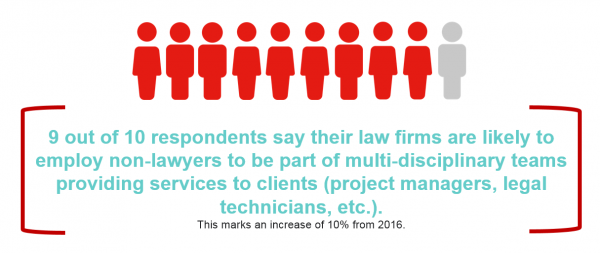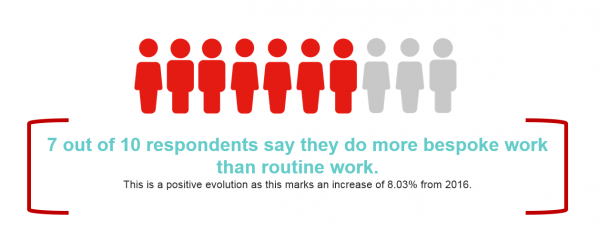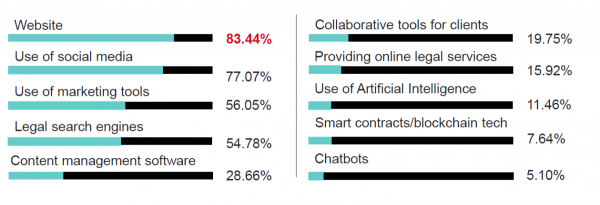Lawyers seem to be positive towards the future, but cite resistance to innovation, rise of alternative providers of legal services and commoditisation as the biggest challenges to the future of their profession.
From September to October 2018, AIJA in collaboration with the Council of Bars and Law Societies in Europe surveyed lawyers between 25 and 45 years old across 48 countries. The purpose of the survey was to measure the evolution of lawyers’ perceptions towards the challenges affecting the future of the profession since a similar survey was undertaken in 2016..png)
These are the top biggest threats to the future of the legal profession, as nominated by the respondents of the survey.
1. Resistance to innovation
Close to 47% of lawyers have rated resistance to innovation the first biggest threat to the profession. The outlook for the future is nevertheless positive, as this marks a decrease of nearly 24% from two years ago.
2. The rise of alternative providers of legal services
86% of lawyers believe that law firms are likely to employ non-lawyers (e.g. project managers, legal technicians) to provide services to their clients in the future. This marks an increase of 10% from 2016.

Pressure to increase cost-effective competency and processes as well as leverage new technologies could be some of the drivers towards outsourcing many legal services to alternative providers. The complexity of services and tasks performed by lawyers will only continue to rise. Consequently, alternative providers of legal services will continue to rise as well, as more areas of specialisation may come forth.
3. Commoditisation of legal services
The commoditisation of legal services is rated the third biggest threat (30%). Not surprisingly, this is already challenging the law firms’ traditional business models. Law firms will need to keep on adapting their business to the commoditisation.
The latest survey findings also reveal that compared to 2016, lawyers seem to be doing more bespoke work (increase of 8%) and less routine tasks (decrease of 18.54%).

4. Privatisation of justice
The privatisation of justice is rated the fourth biggest challenge (23%). Lawyers foresee a growing trend on the “privatisation” of justice through alternative dispute resolution mechanisms (“ADR”) like conciliation, mediation, and counselling. While ADR in some cases may help to provide a quicker access to justice to parties who otherwise may face overworked traditional courts, lawyers seem concerned about the guarantees, lack of transparency and overall quality provided by ADR.
5. Use of new technologies.
Compared to 2016 (28% vs 16% in 2018), lawyers seem to be less fearful of technology replacing them in the future (decrease of 43%). While this marks a more positive attitude towards technology, lawyers are yet lagging in the adoption of new technologies in their law firms.
Tech adoption in law firms (2018 results):

To overcome the challenges to the future of the legal profession, law firms are taking some measures. 42% of respondents are confident that their law firms are taking the necessary steps to introduce new tools or ways of working: from developing marketing or AI tools, using cloud and online databases, automatisation, to legal project management, developing internal knowledge and establishing multi-disciplinary partnerships.

Prepare for the future.
Business acumen (customer-centric approach), solid digital proficiency, good management skills and openness towards innovation are mentioned as essential skills for the legal profession. With the rise of new technologies, being simply a knowledgeable lawyer is no longer enough. However, only 3% agree that the training of lawyers is sufficiently adapting to the changing landscape of the legal market. More legal training seems required to adapt accordingly and ensure that lawyers remain indispensable in the era of AI technology.
Skills for lawyers in the future (2018 results):

'Human beings have a natural tendency to resist change. Lawyers are no different. The decision to evolve and adapt to an increasingly changing legal landscape is simply good business and lawyers should seek to ensure a sustainable business model for their law firms in the long term', says Xavier Costa, AIJA President.
‘The rapid changes in technology represent an opportunity for lawyers and their business. We should embrace these advances and make good use of new technologies to provide better services to the society and our clients. Quicker, more transparent and efficient legal services will result in increased trust from clients and, thus, in more business for lawyers.
'Lawyers must work closely with the industries leading the digital revolution to ensure that the legal principles that had guaranteed decades of stability, peace and economic growth remain adequately implemented in a digital world’, he concludes.
The findings of the survey were presented by AIJA at the Council of Bars and Law Societies in Europe (CCBE) conference ‘Artificial Intelligence and Human Justice’ held on 30 November, in Lille; as well as at the LEGAL ®EVOLUTION Expo & Congress held on 4 December in Frankfurt.
To view the full results, please download this summary.